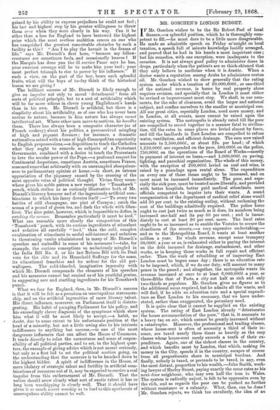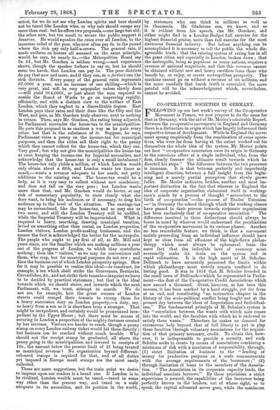MR. GOSCHEN'S LONDON BUDGET.
IF Mr. Goschen wishes to be the Sir Robert Peel of local finance,—a splendid position, which he is thoroughly com- petent to fill,—he must dare to be a little more disagreeable. He made an admirable speech on Friday se'nnight on local taxation, a speech full of minute knowledge lucidly arranged, and proved that he had in his hands a most important case ; but his remedies, with one exception, were inadequate to the occasion. It is not always good policy to administer doses in drops, particularly when the patients are so thick-skinned that they only believe in medicine when it is drastic. When a doctor wants a reputation among Arabs he administers croton oil. Mr. Goschen wished to show generally that the rating system under which a taxation of 20,000,0001., or one-third of the national revenue, is borne by real property alone requires revision, and specially that in London it must either be revised or improvement must stop. We shall, in our com- ments, for the sake of clearness, avoid the larger and national subject, and confine ourselves to the smaller or municipal one. All our great cities, especially London, need more money, and in London, at all events, more cannot be raised upon the existing system. The metropolis is already rated till the poor are compelled to crowd together in a manner fatal to civiliza- tion, till the rates in some places are levied almost by force, and till the landlords in East London are compelled to refuse water, ventilation, and efficient drainage. The sum now raised amounts to 3,500,000/., or about 22s. per head ; of which 1,250,000/. are expended on the poor, 500,0001. on the police, 750,0001. on the operations of the Board of Works—mostly in payment of interest on loans,—and 1,000,0001. on paving, lighting, and parochial organization. The whole of this money, with the exception of 200,0001. levied on coal and wine, is raised by a poundage upon rental alone. The expenditure on every one of these items ought to be increased, and on most must be increased immediately. The poor, and espe- cially the sick poor, must be treated more liberally, and provided with better hospitals, better paid medical attendants, more officials competent to inquire into their wants. A sound reorganization of the department of medical relief alone would add 30 per cent. to the existing outlay, without reckoning the cost of the buildings admittedly required. The police force ought to cost just twice as much as it does, its numbers being increased one-half and its pay 50 per cent.; and is imme- diately to cost at least 20 per cent. more. The local rates ought to be so increased as to enable the Vestries to secure the cleanliness of the streets,—a very expensive undertaking,— and as to the Metropolitan Board, it wants at least another million a year. Its whole revenue, except some trumpery 30,0001. a year or so, is exhausted either in paying the interest on the debt incurred for drainage, embankment, and other works, or in keeping those works in full repair and efficient order. Then the work of rebuilding or of improving East London must be begun some day ; there is an education rate to be imposed, which, if we do our duty, will amount to many pence in the pound ; and altogether, the metropolis wants its revenue increased at once to at least 6,000,000/. a year, or three-fifths that of Paris, a city not half as rich and only two-thirds as populous. Mr. Goschen gives no figures as to the additional sums required, but he admits all the wants, and will find, if he adds an education rate and a special expendi- ture on East London to his summary, that we have under- stated, rather than exaggerated, the pecuniary need.
It is quite clear that it cannot be supplied on the existing system. The rating of East London already " deteriorates the house accommodation of the poor," that is, it amounts to a heavy tax on air, which cannot be greatly increased without a catastrophe. Moreover, the professional and trading classes, whose house-rent is often of necessity a third of their in- come, are taxed nearly three times as heavily as the easy classes whose house-rent rarely exceeds a tenth of their ex- penditure. Again, one of the richest classes in the country, and which benefits most by London, that which, making its money in the City, spends it in the country, escapes of course from all proportionate share in municipal burdens. And finally, nobody is taxed, or pretends to be taxed, in any, even the most distant, proportion to his wealth,—John Smith, work- ing lawyer of Harley Street, paying exactly the same rates as his next-door neighbour, who may own half the iron in Wales. The system is radically unjust, is felt to be oppressive even by the rich, and as regards the poor can be pushed no further without resistance or a calamity. What, then, can be done ? Mr. Goschen rejects, we think too cavalierly, the idea of an octroi, for we do not see why London spirits and beer should not be taxed like London wine, or why salt should escape any more than coal: but he offers two proposals,—one large but old; the other new, but too small to secure the public support it deserves. He would equalize the rates over all London, to the immense relief of the poor, who now often pay 6s. in the pound where the rich pay only half-a-crown. The general rate, if made uniform on houses all assessed on the same principle, would, he says, be nearly 4s.,—the Metropolitan Board say Bs. 4d., but Mr. Goschen is seldom wrong,—and experience shows, though the speaker forbore to say so, lest he should seem too harsh, that London can pay 5s. The poor districts do pay that now and more, and if they can, so a fortiori can the rich districts. Every penny of the general rates represents 67,0001. a year, and an increase of one shilling—which is very great, and will be very unpopular unless slowly done —will yield 904,0001., or just about the sum required to enable the Board of Works to go on improving rapidly, efficiently, and with a distinct view to the welfare of East London, which they neglect to a discreditable degree. East London pays their rates and their dues like the City and the West, and gets, as Mr. Goschen truly observes, next to nothing in return. Then, says Mr. Goschen, the rating being adjusted, let Parliament surrender the house-tax to the municipalities. He puts this proposal in as cautious a way as he puts every other, but that is the substance of it. Suppose, he says, Parliament votes a penny on the income-tax for municipal purposes, and then the cities sell their right to the penny which they cannot collect for the house-tax, which they can. Very good ; but why not give the municipalities the house-tax at once, keeping the income-tax for Imperial necessities, and acknowledge that the house-tax is only a small instalment ? The house-tax only yields a million, of which London would only obtain about a fifth, and London wants ten times as much,—wants a revenue adequate to her needs, not petty additions to the existing rate. The house-tax would be a help, as it is very easy to collect without new machinery, and does not fall on the very poor ; but London wants more than that, and Mr. Goschen would do better, at any risk of momentary popularity, to state clearly what she does want, to bring his audience, or if necessary, to drag his audience up to the level of the situation. The carriage-tax may be surrendered, like the house-tax, and so may one or two more, and still the London Treasury will be unfilled, while the Imperial Treasury will be impoverished. What is required is heavy, searching, drawing municipal taxation, levied on something other than rental, on London properties, London visitors, London profit-making businesses, and the sooner the fact is acknowledged the better for the metropolis. The people who ought to pay first of all, as Mr. Mill said years since, are the families which are making millions a year out of the progress of London, to which they contribute nothing ; then the " visitors," as we may for convenience call them, who reap, but for municipal purposes do not sow ; and then the business out of which London prosperity springs. How far it may be possible to realize this ideal—to construct, for example, a tax which shall strike the Grosvenors, Bentincks, Cavendishes, &c., and not strike their tenants—is apointwe leave to be decided by practical statesmen ; but that is the ideal towards which we should strive, and towards which the next Parliament will, we trust, attempt to march. We do not see, for example, how the great owners of London streets could compel their tenants to recoup them for a heavy succession duty on London property,— a duty, say, as heavy from a son as it is elsewhere from a stranger. That might be inexpedient, and certainly would be pronounced inex- pedient by the Upper House ; but there must be means of
securing to London a proportion of the mighty fortunes created by her increase. Visitors are harder to reach, though a penny stamp on every London railway ticket would hit them directly ; but business can be reached without much trouble. Why should not the receipt stamp be graduated, all above the penny going to the municipalities, and lowered to receipts of 10s., the amount below the present limit of 21. being treated as municipal revenue ? No organization beyond different- coloured stamps is required for that, and of all duties yet imposed in Europe small stamps are the most easily collected.
These are mere suggestions, but the main point we desire to impress upon our readers is a broad one. If London is to be civilized, London wealth must be taxed,—taxed in some way other than the present way, and taxed on a scale adequate to its necessities, and its position in the world,
by statesmen who can think in millions as well as in thousands. Mr. Gladstone can, we know, and so it is evident from his speech, can Mr. Goschen, and either might find in a London Budget full exercise for the highest financial genius, more than full exercise for the most strenuous financial industry. But before anything can be accomplished it is necessary to tell the public the whole dis- agreeable truth ; that the existing system of rating has in all the great cities, and especially in London, broken down ; that the metropolis, being as populous as many nations, requires a revenue of national magnitude, and that this revenue cannot be obtained without new and heavy sacrifices from those who benefit by, or enjoy, or create metropolitan prosperity. The machine cannot go on without a revenue of six millions, and the more carefully that harsh truth is concealed, the more painful will be the acknowledgment which, nevertheless, cannot be avoided.































 Previous page
Previous page